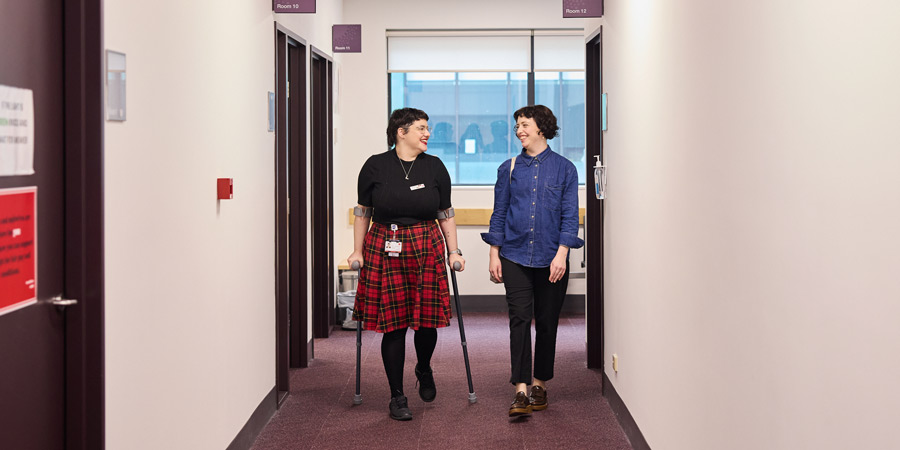
The Women’s celebrated International Day of People with Disabilities (3 December 2024) to highlight the contribution that people with disabilities make to our hospital and community. It’s also an opportunity to recognise the importance of inclusion to our culture and our ability to provide respectful and accessible healthcare.
This year, our focus is on raising awareness and supports for people living with disabilities that are not always obvious, sometimes referred to as ‘hidden’ disabilities. A hidden disability is a condition, injury or chronic illness that’s not immediately visible to others, ranging from neurological, physical, sensory and other difficulties.
As diverse as these conditions are, so are people’s individual access needs. Someone who understands this as both a healthcare worker and patient, is Nurse Midwife Julia.
Julia has been working at the Women’s for five years in the Reproductive Services Unit and Maternity Services Department. She lives with Ehlers-Danlos syndrome, or EDS.
“A normal week for me is chronic pain and at least one dislocation, yet nothing wrong shows up on an x-ray. On bad days I’ll use mobility aids, otherwise my disability is completely invisible,” she says.
“I often have to advocate for myself because it’s difficult for some people to believe I have a disability unless I’m using my crutches.
“At work, my ability to do my job has sometimes been questioned. I get asked ‘are you ok? or ‘are you sure you can do this?’. But I believe having a disability is what makes me a good nurse because I know what it feels like."
“I am able to do everything in my current role as a nurse and midwife – I just might do it differently than able-bodied people.”

At the Women’s, we are working towards becoming a disability-confident organisation guided by our Disability Action Plan (DAP) 2022-2025.
In collaboration with the Royal Melbourne Hospital, we have begun rolling out the Hidden Disabilities Sunflower. The Peter MacCallum Cancer Centre will also be part of the program in 2025.
The program aims to foster a positive and cohesive experience across the sites, as many patients and staff visit all three hospitals.
Some of our key front-facing staff have been trained to provide support to people with hidden disabilities who may choose to wear a sunflower symbol. Further training is planned for staff across the hospital in 2025.
Julia is one of the first trained Sunflower ambassadors. She hopes the Hidden Disabilities Sunflower encourages awareness and acceptance of all types of disabilities.
“Being able to wear a sunflower to show you need a little extra help, without the invasive questioning, is such a powerful thing.
“I’m proud to work at a hospital that recognises the need for programs like these. They are so important to making disability not just visible, but normal.”
In addition to the Hidden Disabilities Sunflower launch, the Women’s is marking International Day of People with Disabilities with a special Grand Round. Staff will be able to learn more about the experiences of autistic people navigating the healthcare system and providing neuro-affirming care.
The Women’s acknowledges the contributions that people with disabilities make to our hospital and our community – on International Day of People with Disabilities and every day of the year.
Read our Disability Action Plan 2022-2025 (PDF, 2.6MB). Or the Disability Action Plan 2022-2025 Easy English version (PDF, 2.9MB).